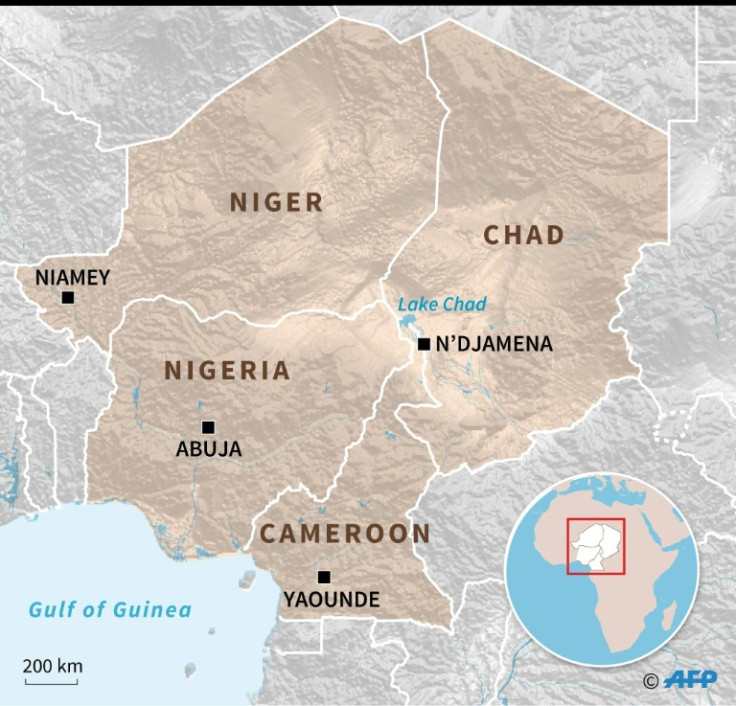Lack Of Regional Cooperation Hampering Lake Chad Jihadist Fight

Lack of military coordination and tension among countries in Africa's Lake Chad region are hindering efforts to end a more than decade-long jihadist insurgency, according to local officials and security sources.
The region, comprising the four countries that surround Lake Chad -- Cameroon, Chad, Niger and Nigeria -- has been battling insurgency since 2009, after a spate of violent campaigns by the Boko Haram jihadist group in Nigeria's northeast spilled into its neighbours.
The ensuing conflict, which has drawn in other jihadist groups such as the Islamic State West Africa Province (ISWAP), has killed over 40,000 people and displaced around two million, causing one of the world's worst humanitarian crises.
Last week, Nigeria's Yobe State, one of the most impacted by jihadist violence, held a summit to discuss how to stabilise and recover areas affected by the conflict, in collaboration with organisations including the United Nations Development Programme (UNDP).
The lake region has become a jihadist stronghold, disrupting fishing, farming and herding, on which the 40 million people who live there depend.
Jihadist violence has added to the cocktail of challenges the region has faced for the last 40 years.
The lake's surface water has shrunk by 90 percent due largely to climate change and mismanagement, making the region's population among the world's poorest.
Since 2013, a regional military coalition involving troops from the four countries, the Multinational Joint Task Force (MNJTF), has been fighting Islamist groups in the area.
But recent diplomatic faceoffs, especially between Nigeria and Niger, are hampering progress, military chiefs said.
Relations between the two neighbours soured after the military took power in Niger in 2023.
The Economic Community of West African States (ECOWAS), currently headed by Nigerian President Bola Tinubu, responded with crippling sanctions, and Niger broke away from the group.
Chad, Niger and Nigeria hurled allegations of lethargy, sabotage and non-cooperation during the summit, warning that the situation was hindering the anti-jihadist fight.
In a veiled message to Niger, Nigeria's Tinubu warned that regional discord would only benefit Boko Haram and ISWAP, which he described as the "true enemy".
He told the summit the jihadists do not stand "a chance against the collective strength" of the regional military coalition, warning against "misinformation and falsehoods which breed mistrust".
But the governor of Niger's Diffa region, Brigadier General Mahamadou Ibrahim Bagadoma, said there could only be cooperation and coordination when Nigerian interference and sabotage against his country stopped.
He reiterated recent claims that French troops recently expelled from his country were using Nigeria as a base to attack Niger. Nigeria has repeatedly denied the accusation.
"The problem is while some are making efforts, some are sabotaging them," Bagadoma said at the summit.
He told reporters that "the existing sour relations (with Nigeria) is a political issue" that would be difficult to solve as long as "some people take the path of selfishness".
The governor of Chad's Lake Province, General Saleh Tidjani Haggar, deplored the lack of military and intelligence sharing between the four countries.
The region could "finish off Boko Haram in three months" if it worked together, he said.
A Nigerian intelligence report seen by AFP and shared among Nigerian security circles on Monday showed how ISWAP had chased out communities in the Damasak area along Nigeria's border with Niger in preparation for a possible attack on military bases in the region, highlighting the lack of coordination between the two countries.
An AFP journalist saw the MNJTF commander, Nigerian Major General Godwin Mutkut, complaining to Bagadoma on the sidelines of the summit about an alleged order for Niger's military officers not to talk to their counterparts from Nigeria.
Speaking at the summit, General Christopher Musa, Nigeria's defence chief, called on Niger to come back into the fold of the MNJTF.
"I'm very happy... that the governor of Diffa is here. I want to assure him that we are one family. There is no dispute between us that cannot be solved," Musa said.
Mamman Nuhu, the head of the Lake Chad Basin Development Commission (LCBDC), acknowledged the negative impact the lack of military coordination between Nigeria and Niger is having on the region despite the "huge progress" made.
"Defeating Boko Haram is key to restoring peace and prosperity to the region," Nuhu told AFP.
© Copyright AFP 2024. All rights reserved.





















